Contents
Market Overview
Macro Review
Lower inflation gears the market to consider cutting interest rates sooner, but Federal Reserve officials are more hesitant. The monthly CPI reading was the slowest increase since August 2021, while the year-over-year CPI figure was the slowest increase since April 2021 and “supercore” inflation was negative for the first time since September 2021. However, the June FOMC delivered a more hawkish reading of the U.S. economy in the quarterly Summary of Economic Projections. The 19 officials shifted to one cut in 2024 versus three back in March, with a higher longer-run dot. The FOMC officials are instead focused on a December rate cut, but the market is giving some optionality to September and November meetings. Specifically, 15 of the 19 officials expect one or two cuts, while four anticipate the Central Bank keeping policy rates unchanged. Chair Powell made a point of indicating that most officials did not incorporate the softer-than-expected inflation reading in the economic projections and dots, but it was downplayed as one data point given the solid economic performance and labor market. On this topic, the May non-farm payroll data is likely to be forgotten despite significantly beating expectations (272k versus 180k). On Friday, the JPY fell against the USD to a one-month low after the BoJ, at its policy meeting, declined to give much detail about plans to reduce bond purchases in July. In Europe, the political drama in France took more twists and turns, driving peripheral spreads wider. Earlier in the week, the Ukraine Recovery Summit kicked off in Germany, followed by the G7 meetings in Italy. Tensions remain elevated in northern Israel, just as ceasefire negotiations with Hamas fell apart. In South Africa, the ANC reached agreement on a governance alliance with DA and IFP, a moderately constructive outcome. Mexico looks set to pass judicial reform that weighed on the currency. Argentina’s rating was affirmed by Fitch, the government’s omnibus and fiscal bills passed in Senate, it renewed the China swap and received an IMF disbursement. Market concerns about Brazil’s fiscal framework and FinMin Haddad’s standing came back to the forefront this week but appear overdone from our perspective.
EM Credit Update
Emerging markets sovereign credit (cash bonds) ended the week up +0.9% despite spreads being 5bps wider. Sovereign outperformers were Tunisia, Argentina and South Africa, while Namibia, Georgia and Serbia underperformed. The Republic of Zambia had reached an agreement with creditors in March and the newly restructured bonds were free to trade this week. Corporate credit was 0.5% stronger at the index level with spreads 9bps wider. EM local currency sovereign debt underperformed under pressure by a strong USD and relatively hawkish Fed signaling, losing 0.4%.
The Week Ahead
A key test for global markets will be on G10 central banks. The question is whether the Swiss National Bank will cut rates on June 20th and ease policy rates for a second time since April. The Swiss National Bank precipitated the Riksbank (Sweden) in May and ECB in early June. The Bank of England, on the other hand, will be keeping policy rates on hold as the decision is all but postponed given the timing of the UK election on July 4th. China will be updating the market with the PBoC one-year MLF rate (2.50%) before the one-year and five-year LPR decisions (3.45% and 3.95%). Chinese economic data also covers industrial production, retail sales and fixed asset investment. Other key EM interest rate decisions are due from Brazil (10.5%), Costa Rica (4.75%), Chile (6.0%), Hungary (7.25%) and Paraguay (6.0%). The market will also be focused on South African inflation, along with the inauguration of the new government. Finally, we can expect inflation releases out of Poland and Russia, just as Ukraine offers 1Q GDP data.
Highlights from emerging markets discussed below: Mexico’s election delivers landslide victory for Sheinbaum and ruling Morena party, South Africa ANC reaches agreement on governance alliance with DA and IFP, Market concerns about Brazil’s fiscal framework and FinMin Haddad’s standing appear overdone, and Argentina omnibus and fiscal bills pass in Senate; government renews China swap and receives IMF disbursement.
Fixed Income
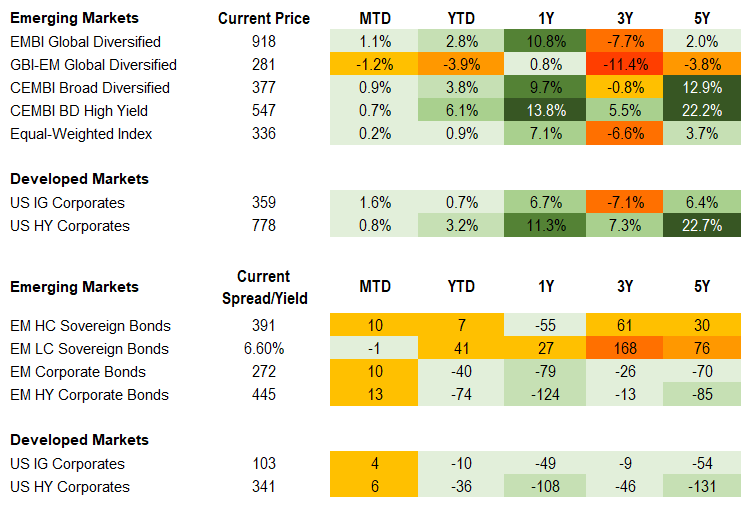
Equities
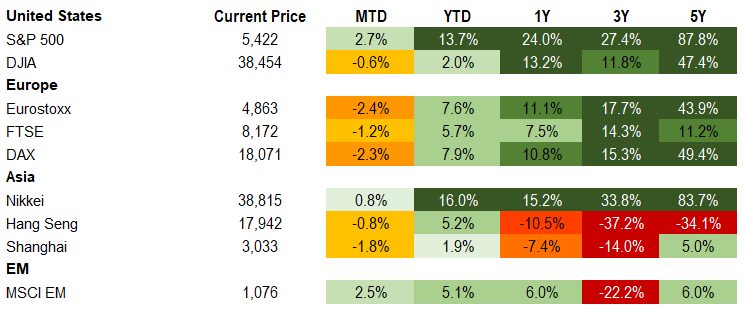
Commodities

Source for data tables: Bloomberg, JPMorgan, Gramercy. EM Fixed Income is represented by the following JPMorgan Indicies: EMBI Global, GBI-EM Global Diversified, CEMBI Broad Diversified and CEMBI Broad High Yield. DM Fixed Income is represented by the JPMorgan JULI Total Return Index and Domestic High Yield Index. Fixed Income, Equity and Commodity data is as of June 14, 2024 (early-afternoon).
Emerging Markets Weekly Highlights
Mexico’s election delivers landslide victory for Sheinbaum and ruling Morena party
Event: On June 2nd, Mexico held its general election where current President Andres Manuel Lopez Obrador (AMLO)’s successor candidate, Claudia Sheinbaum, secured a sizeable victory with 60% support over opposition candidate Xochitl Galvez, who received 27% of the votes. While official congressional seats are not designated until August, Morena and its allies appear to have comfortably secured a supermajority in the Lower House (372/500 seats, 75%) and just shy of a qualified majority in the Senate (83/128 seats, 65%). In the aftermath, Sheinbaum announced that current Finance Minister, Rogelio Ramirez de la O, will remain in his post. Despite signals of macroeconomic policy continuity, the peso sold-off over 15% on the unexpected ability to pass constitutional reforms.
Gramercy Commentary: The election outcome provides the new Administration with a robust mandate to execute policy. The commitment to macroeconomic policy continuity under Ramirez de la O with the stated intention to consolidate the deficit to 3% of GDP as well as announced 2025 buybacks is constructive. Details on the consolidation path, which will be outlined in the budget in November, will be key for markets and rating agencies. The supermajority also provides the authorities with a wider array of options to support Pemex. The market reaction is currently prioritizing the risks that stem from the likely passage of a highly controversial judicial reform later this year, which even after debate and discussion, will likely erode institutional quality, checks and balances, and increase uncertainty with respect to reforms and policy throughout Sheinbaum’s term. This could weigh on ratings and investments, but it will take time to assess the ultimate implications, leaving room for retracing of recent pressure on Mexican assets. While the FX adjustment has been swift, we think intervention at these levels will be avoided and the competitive benefits of the flexibility of the peso will be prioritized. If further material weakness ensues, an NDF program may be utilized.
South Africa ANC reaches agreement on governance alliance with DA and IFP
Event: The final results of the May 29th election delivered a material drop in ANC support to 40.2% (from 57% in 2019) followed by the center right opposition DA party with 21.8%, former President Zuma’s newly formed populist MK at 14.6% and the EFF at 9.5%. As a result, ANC, DA, and IFP have reached an agreement to back Ramaphosa as President and struck a broader governing framework. Together, the three main parties in the arrangement hold 274 seats (68.5%). Parliament selected ANC Thoko Didiza as Speaker while the DA will hold the Deputy Speaker position as well as at least five other cabinet positions. South African assets have been relatively well behaved after some initial volatility.
Gramercy Commentary: The outcome is moderately constructive as we see the agreement as durable, at least in the near-term, with prospects for incremental reform momentum. We expect cabinet positions to be announced in relatively short order with a decent chance Godongwana retains his position as Finance Minister, although a DA appointment would likely be taken positively by the markets. Coalition partners may take up other Deputy positions and/or Minister of Public Enterprises or Tourism. Governability will be watched closely with no expectations for major policy initiatives out of the gate and the October MTBS as the first big test for the unity government.
Market concerns about Brazil’s fiscal framework and FinMin Haddad’s standing appear overdone
Event: Pressure on Brazil’s sovereign/macro assets escalated this week as investors grew concerned about Finance Minister Fernando Haddad’s challenges to get additional revenue-raising measures needed to meet the administration’s 0% of GDP primary (prior to debt service payments) fiscal target for 2024 approved by Congress.
Gramercy Commentary: We see concerns about Brazil’s fiscal framework and Finance Minister Haddad’s political standing/future within the Lula Administration, especially from onshore investors, as pre-mature and overdone. As such, we expect the weakness observed in Brazilian assets recently to gradually unwind in the coming weeks. We believe that Finance Minister Haddad is secure in his position and arguably remains President Lula’s strongest/most important cabinet member, despite some well-publicized spats with other influential PT officials who are pushing against Haddad’s market-friendly policy approach. After a series of recent negative headlines and political setbacks around Haddad’s quest to ensure a balanced primary budget balance this year, we expect to see some “wins” for the Finance Minister in the coming weeks that should take down the temperature in the political environment. Meanwhile, we anticipate that the Central Bank will pause its policy easing cycle to keep the SELIC policy rate at 10.5% at the June 19th COPOM meeting, citing increased medium-term inflation expectations on the back of fiscal uncertainties. Given Brazil’s high real interest rates and current inflation close to target, we think policy tightening is highly unlikely and deem current market pricing of rate hikes in the short end of the LC curve as unjustified.
Argentina omnibus and fiscal bills pass in Senate; government renews China swap and receives IMF disbursement
Event: The Argentine Senate narrowly passed diluted omnibus and fiscal bills and sent them back to the Lower Chamber for a vote on June 24th. Additionally, the authorities announced a $5bn rollover of the China swap and the IMF board approved the 8th review under the existing EFF program which resulted in an $800mm disbursement. May inflation printed at 4.2% (vs. 4.95% consensus), down from 8.8% m/m the month prior. Annual inflation declined to 276% y/y from 289%.
Gramercy Commentary: The progress on legislative governability is a positive development along with continued support from multilateral and bilateral lenders. Similarly, a continued downward path of sequential inflation is welcomed news for the broader macroeconomic adjustment. With that being said, markets will be looking towards the next stage of policy including a broader FX and monetary framework coupled with a timeline for removal of capital controls.
Emerging Markets Technicals
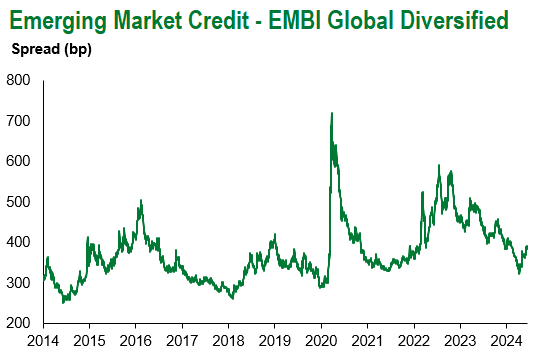
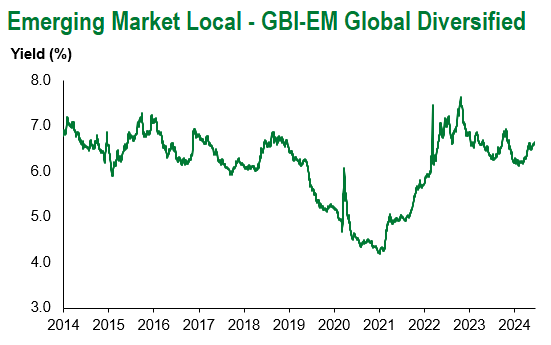
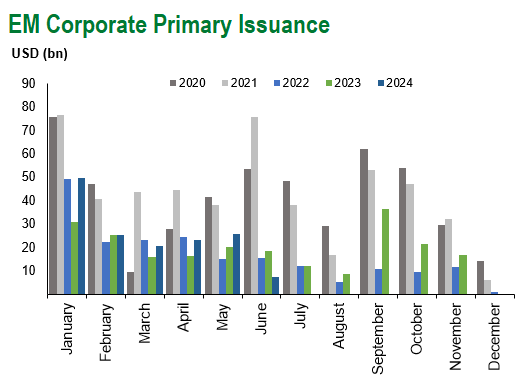
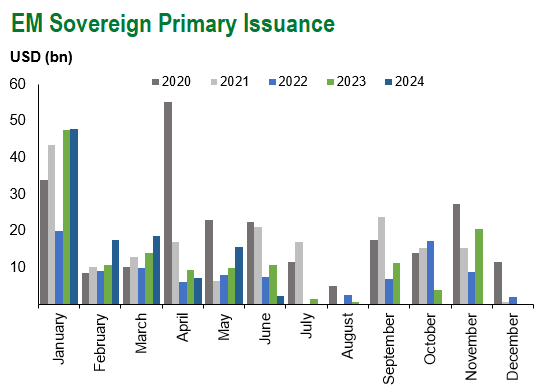
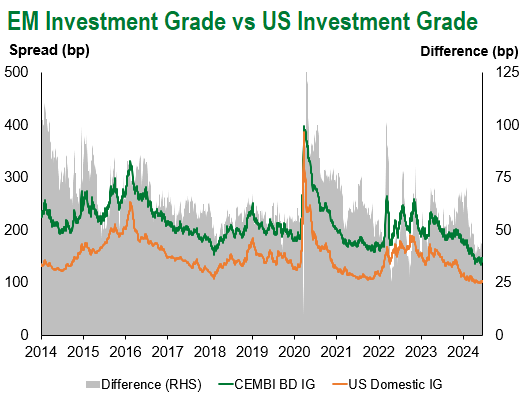
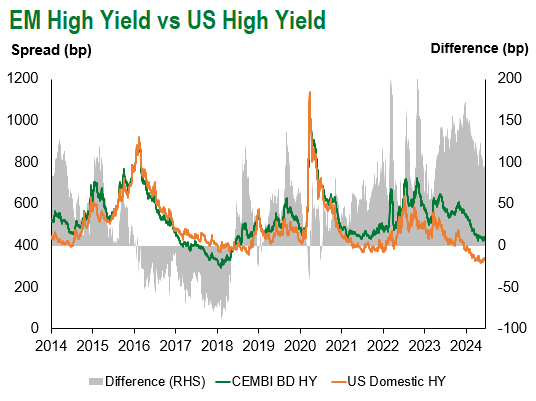
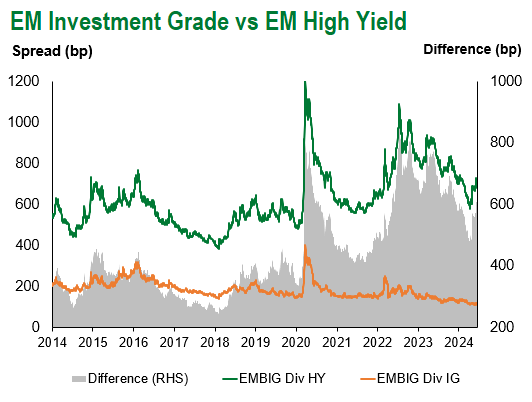
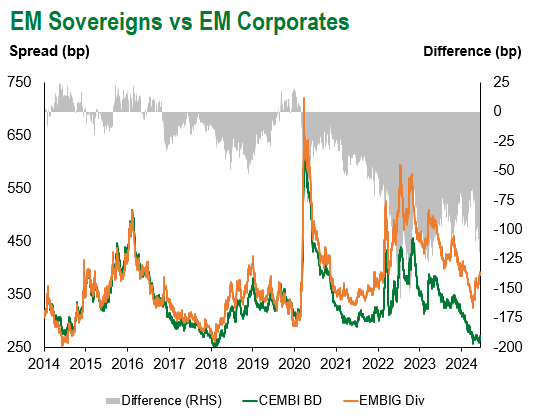
Emerging Markets Flows
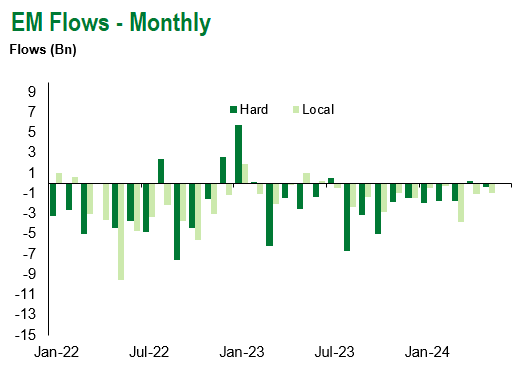
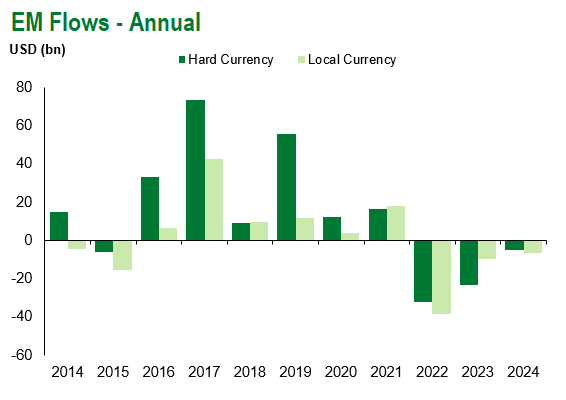
Source for graphs: Bloomberg, JPMorgan, Gramercy. As of June 14, 2024.
For questions, please contact:
Kathryn Exum, CFA ESG, Director, Co-Head of Sovereign Research, [email protected]
Petar Atanasov, Director, Co-Head of Sovereign Research, [email protected]
James Barry, Director, Deputy Portfolio Manager, [email protected]
This document is for informational purposes only. The information presented is not intended to be relied upon as a forecast, research or investment advice, and is not a recommendation, offer or solicitation to buy or sell any securities or to adopt any investment strategy. Gramercy may have current investment positions in the securities or sovereigns mentioned above. The information and opinions contained in this paper are as of the date of initial publication, derived from proprietary and nonproprietary sources deemed by Gramercy to be reliable, are not necessarily all-inclusive and are not guaranteed as to accuracy. This paper may contain “forward-looking” information that is not purely historical in nature. Such information may include, among other things, projections and forecasts. There is no guarantee that any forecasts made will come to pass. Reliance upon information in this paper is at the sole discretion of the reader. You should not rely on this presentation as the basis upon which to make an investment decision. Investment involves risk. There can be no assurance that investment objectives will be achieved. Investors must be prepared to bear the risk of a total loss of their investment. These risks are often heightened for investments in emerging/developing markets or smaller capital markets. International investing involves risks, including risks related to foreign currency, limited liquidity, less government regulation, and the possibility of substantial volatility due to adverse political, economic or other developments. References to any indices are for informational and general comparative purposes only. The performance data of various indices mentioned in this update are updated and released on a periodic basis before finalization. The performance data of various indices presented herein was current as of the date of the presentation. Please refer to data returns of the separate indices if you desire additional or updated information. Indices are unmanaged, and their performance results do not reflect the impact of fees, expenses, or taxes that may be incurred through an investment with Gramercy. Returns for indices assume dividend reinvestment. An investment cannot be made directly in an index. Accordingly, comparing results shown to those of such indices may be of limited use. The information provided herein is neither tax nor legal advice. Investors should speak to their tax professional for specific information regarding their tax situation.